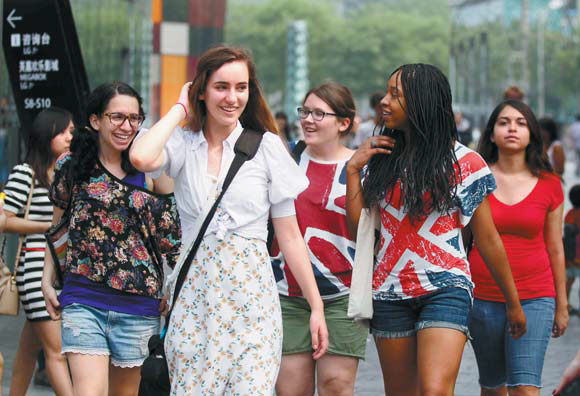Foreigners will be faced with a question of identity
Updated: 2012-05-29 02:40
By Cui Jia, He Na and Peng Yining (China Daily)
|
|||||||||||
|
 Sanlitun, in Beijing, is a popular destination for foreigners. [Wang Jing / China Daily]
|
Mike Jones took his passport and rental contract to Shuangjing police station in Beijing's Chaoyang district on Sunday.
The 26-year-old US citizen, who has been in China since 2008, had not felt the need to register with the police before a 100-day crackdown was launched on May 15 to combat what's become known as the "three illegals". This refers to foreigners who have entered illegally, overstayed their visa or been employed without obtaining a work permit.
The freelance documentary producer returned from Los Angeles on Saturday and said "turning himself in" was the first thing he did.
"I heard about the crackdown when I was in the US and then remembered that I hadn't registered with the local police, as required after moving to my new apartment. I really don't want to get into trouble," he said. "I know when the Chinese authorities use the term 'crackdown', they mean business."
At a counter with a sign reading "Temporary residence registration for foreigners", a policewoman took Jones' passport and checked that his visa was in order. She then entered his passport details and current address into the computer and printed out a police registration card within five minutes.
"Make sure you carry the card and your passport with you at all times for routine stop-and-checks," she said, handing over the card. "Also, you can show the card to the taxi driver to take you home when you’re drunk." She wasn't joking.
The policewoman said Shuangjing police station issues a large number of police registration cards. The area is popular with foreigners for two reasons: It is in close proximity to the central business district and also the apartments are relatively modern. "I hear that the number of foreigners registered with Nanhu police station near the Wangjing area is the highest in Beijing and the majority of them come from the Republic of Korea," she added, explaining that locals often refer to the area as "Korean Town".
Citizens of the ROK, the US, Canada, Russia and Japan were the top five nationalities involved in "three illegal" cases in 2011, according to the exit-entry administration of the Beijing Municipal Public Security Bureau.
More than 20,000 "three illegal" foreigners were dealt with nationwide last year, according to Yang Huanning, vice-minister of public security.
However, the crackdown has provoked controversy within Beijing's expatriate community and the overwhelming reaction has been one of concern.
Ismael de Pierrepont, a 29-year-old Frenchman who works for an online Chinese retail company, said some friends were recently asked by police to show their passports in the Sanlitun area of Beijing, a popular spot for foreigners. "One of my friends had to sneak out of a bar through the back door, because he didn't have his passport with him," he said. "Since then I have carried my passport with me at all times."
Having lived in Beijing for four years, De Pierrepont said he wasn't surprised by the campaign. "I've had the police knock on my door and ask to see my passport, without giving a reason. It has happened twice in the past four years," he said. "I didn't say anything. I simply showed them my passport.
"I speak Chinese, I have Chinese friends and I use Sina Weibo (China's leading micro blog service). I know what's going on in China and I know the rules," he said. "If the government asks you to do something, you do it."
What concerns him is not the policy itself, but the attitude that surrounds it. "In China, I always feel so different," he said. "People treat you differently, for good or bad, just because you are foreign."
Take the phrase laowai, the common Chinese term for foreigners: De Pierrepont said it can sometimes be used as a pejorative term rather than simply a neutral description. "The word sometimes sets the two groups, Chinese and foreigners, in opposition," he said.
Age-old enmity can also play a role, something De Pierrepont discovered when visiting Yuanmingyuan (Old Summer Palace) in Beijing, a couple of years ago. After discovering his nationality, a Chinese visitor told De Pierrepont, "I don't like French people." His prejudice stemmed from the days of the Second Opium War (1856-1860), when French expeditionary forces looted and destroyed the former royal retreat.
"I didn't say anything. I didn't know what to say," he said. "China is not a nation of immigrants. People don't know how to deal with people from different countries and cultures. I hope the situation improves as quickly as China is developing."
"His experience was very rare in China. Most Chinese treat foreigners in a very friendly way, sometimes too friendly," said Qiu Lin, a senior associate at a public relations company.
Today's Top News
President Xi confident in recovery from quake
H7N9 update: 104 cases, 21 deaths
Telecom workers restore links
Coal mine blast kills 18 in Jilin
Intl scholarship puts China on the map
More bird flu patients discharged
Gold loses sheen, but still a safe bet
US 'turns blind eye to human rights'
Hot Topics
Lunar probe , China growth forecasts, Emission rules get tougher, China seen through 'colored lens', International board,
Editor's Picks

|

|

|

|

|

|






